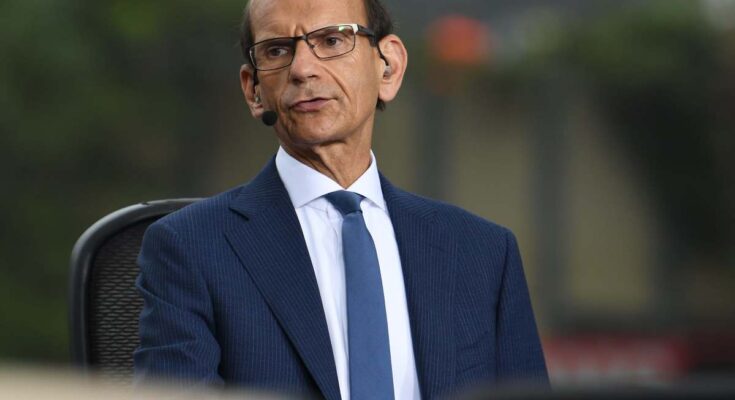JUST IN: SEC Insider Paul Finebaum Declares Clemson a Major Threat—‘Incredibly Difficult to Beat’ in 2025
College football might be months away from kicking off its 2025 season, but the hype machine is already in full swing—and few voices carry more weight in the sport’s media ecosystem than SEC Network analyst Paul Finebaum. Known for his bold takes and deep connections throughout the Southeastern Conference and beyond, Finebaum has made a striking proclamation that’s turning heads well beyond SEC country. In a recent segment, the longtime college football commentator declared that the Clemson Tigers will be “incredibly difficult to beat” in 2025, signaling a potentially resurgent season for the perennial powerhouse. And when Finebaum talks, the entire college football world tends to listen.
This isn’t the first time Clemson has drawn national buzz. After all, under Dabo Swinney, the Tigers have built one of the most respected programs in the nation, with multiple College Football Playoff appearances and two national titles since 2016. But after falling short of their own lofty standards in recent seasons, Clemson has heard the whispers. Some questioned if the dynasty was fading. Some wondered if Swinney could adapt to the changing dynamics of the sport—NIL, the transfer portal, new playoff formats. And yet, according to Finebaum and others observing closely, 2025 might be the year Clemson shuts all of that down.
Finebaum didn’t hold back in his assessment. He cited Clemson’s combination of returning talent, elite recruiting classes, and coaching stability as key reasons why the Tigers are primed for a major comeback. Most notably, he emphasized the defensive side of the ball, saying Clemson’s front seven might be the most physical and disruptive in the country. He highlighted players like Peter Woods, TJ Parker, and linebacker Barrett Carter as NFL-ready talents who can dictate the pace of any game. According to Finebaum, very few teams—even in the SEC—will be able to control the line of scrimmage against this group.
Offensively, Finebaum pointed to the continued development of quarterback Cade Klubnik, who enters the season with experience, confidence, and a revamped supporting cast. While Klubnik’s journey has been anything but smooth since arriving as a 5-star recruit, there’s growing belief that 2025 could be the season it all clicks. With a more tailored offensive scheme and a deep stable of playmakers—including a now-healthy wide receiver corps and improved offensive line—Clemson’s offense could finally return to the explosiveness fans saw during the Deshaun Watson and Trevor Lawrence eras.
The statement from Finebaum wasn’t just a casual compliment—it was an assertion that Clemson belongs back in the conversation with Georgia, Michigan, Alabama, and Ohio State. He even suggested that if the Tigers stay healthy and win key early-season matchups, they could secure one of the top seeds in the newly expanded 12-team College Football Playoff. That kind of statement from an SEC stalwart like Finebaum isn’t made lightly. It’s based on conversations with coaches, insiders, and scouts who are seeing firsthand how dangerous Clemson could be.
What’s striking about Finebaum’s praise is the timing. Clemson isn’t entering the season as the consensus No. 1 or even a top-three favorite in most early polls. In fact, many preseason rankings have placed them just inside or just outside the top 10. But that’s exactly why his comments have added fuel to the fire. Clemson is now being painted as a sleeping giant—one that’s still fully capable of awakening and wrecking playoff hopes across the country. And there’s something dangerous about a program with Clemson’s pedigree operating with a chip on its shoulder.
Dabo Swinney, for his part, hasn’t backed down from outside doubt. If anything, he’s embraced the skepticism as motivation. Throughout spring and early summer, he’s spoken passionately about the growth of his team, the commitment of his leaders, and the way his younger players have embraced the program’s high standards. And in true Swinney fashion, he’s leaned heavily into a culture-first philosophy, emphasizing the internal drive of his players over any external validation. But even he would admit that hearing someone like Paul Finebaum issue such high praise confirms what they believe inside the program: this team has something special brewing.
Clemson’s schedule in 2025 will give them every opportunity to prove Finebaum right—or wrong. With marquee non-conference games and a gauntlet of ACC competition, the Tigers won’t have to wait long to show where they stand. Early matchups will test both the maturity of the offense and the depth of the defense. But that’s exactly the kind of environment Swinney has thrived in before. When the pressure is highest, Clemson has traditionally found another gear. If that trend holds, a playoff run feels not only possible but likely.
Another layer to Finebaum’s comments is what it means in the broader context of college football’s power structure. For years, the narrative has been shifting toward the dominance of the SEC and, more recently, the Big Ten’s media and financial juggernaut status. But Clemson, as a flag bearer for the ACC, continues to defy that consolidation. With Florida State still in flux and Miami struggling to regain consistency, Clemson remains the ACC’s most powerful brand. If they do indeed become “incredibly difficult to beat,” as Finebaum predicts, they’ll serve as a counterbalance to the sport’s increasing centralization around two or three conferences.
It’s also worth noting the recruiting implications of Finebaum’s praise. Players pay attention to national narratives, and hearing a major media figure validate Clemson’s championship potential only adds to the program’s appeal. Prospects want to play for winners. They want to play on big stages. And they want to be part of a team that gets talked about as a legitimate contender. Clemson, long respected for its development and NFL pipeline, now adds another layer of buzz heading into the critical summer recruiting months. That momentum can’t be overstated.
Of course, the praise will mean little if Clemson doesn’t back it up on the field. Every team in the country is chasing the same prize, and the margin for error is razor-thin. One injury, one upset loss, or one breakdown in execution can derail even the most talented roster. But that’s where Clemson’s continuity and experience could make the difference. Unlike other blue-blood programs that face frequent coaching turnover and roster churn, Clemson enters 2025 with rare stability. Most of the coaching staff remains intact. The locker room is led by seasoned veterans who’ve been through the highs and lows. And the younger players pushing for snaps have been groomed in the same system from day one.
For Clemson fans, Finebaum’s comments are both validation and challenge. Validation that the national media still respects the program, even after recent setbacks. And a challenge to support this team with the kind of belief and intensity that helped fuel their title runs. There’s a sense that this season could be a turning point—not just for 2025, but for the next chapter of Clemson football. A chance to prove they’re not just clinging to past glory but are still one of the sport’s defining programs.
Meanwhile, opponents should take note. If Paul Finebaum—a man not known for sugarcoating—says Clemson will be one of the toughest outs in the country, you better believe they’re preparing accordingly. Expect defensive coordinators to spend extra hours trying to figure out how to slow down Parker and Woods. Expect quarterbacks to circle Clemson week on their calendars as their ultimate test. And expect Clemson to play like a team that’s not just trying to win games—but trying to make a statement every time they step on the field.
In a sport where hype often fades quickly, and preseason narratives change with every injury report and upset loss, Finebaum’s prediction stands out for one reason: it feels rooted in more than just speculation. It reflects a growing belief among insiders that Clemson is ready to reclaim its spot at the center of the college football universe. Whether that ends in playoff glory or another hard-fought campaign remains to be seen. But one thing is clear—nobody will be taking the Tigers lightly in 2025.



